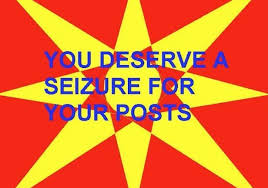A Mind Unraveled: surviving seizures, meds, and inattentive medical care
Posted: 12/11/2018 Filed under: Diagnostic Challenges, Medical Care 2 Comments If you’ve ever experienced discrimination due to a medical condition, or struggled to find a clinician who could restore your health, it may be hard to maintain your composure while reading portions of Kurt Eichenwald’s riveting new memoir, A Mind Unraveled. Eichenwald, an accomplished author and journalist now at Newsweek and Vanity Fair, uses his reporting skills to chronicle the struggles of living with poorly controlled epilepsy. The book is an excellent read, particularly for anyone who’s lived with or cared for someone with epilepsy.
If you’ve ever experienced discrimination due to a medical condition, or struggled to find a clinician who could restore your health, it may be hard to maintain your composure while reading portions of Kurt Eichenwald’s riveting new memoir, A Mind Unraveled. Eichenwald, an accomplished author and journalist now at Newsweek and Vanity Fair, uses his reporting skills to chronicle the struggles of living with poorly controlled epilepsy. The book is an excellent read, particularly for anyone who’s lived with or cared for someone with epilepsy.
In addition to the disruption and anxiety caused by the seizures themselves, Eichenwald contended with inept medical care, employment and health insurance hurdles, and efforts to expel him from college because of his seizures. He describes the frightening physical and emotional experience of grand mal seizures as well as the problems that result from either disclosing his condition or hiding it. But Eichenwald details all this in the larger context of his strong resolve to live as normal and satisfying a life as possible. He mentions seizures due to flash just once (for more on this, see the last section of this post).
By candidly sharing his experiences in a compelling and well-documented story, Eichenwald has done a huge service to those with epilepsy and their families and friends. He shares his confusion, fears, anger, gratitude, and grit as well as his regrets for burdens the seizures placed on others. Spoiler alert: The author eventually found a neurologist who improved his condition. Reducing the number of seizures was possible, but only after undoing damage to his health caused by prior treatment.
Inadequate care
Finding doctors willing to engage with him and treat him as a partner in care was a challenge, especially at the onset of his epilepsy in college. When Eichenwald’s first neurologist made the epilepsy diagnosis, he offered his patient virtually no information about epilepsy or the medicine he prescribed, nor did he answer Eichenwald’s questions. Speaking with an epilepsy support counselor shortly after the diagnosis, Eichenwald’s lack of understanding of epilepsy and his treatment was evident:
The counselor mentioned grand mal seizures, and I interrupted him. “I don’t need to worry about those. My neurologist said I won’t have them anymore.”
“That’s good,” he replied, hesitation in his voice. “How did he determine that?”
“Because I’m going on the medication.”
What Eichenwald didn’t yet know, because he hadn’t been told, is that there are no guarantees for a given individual that a given anticonvulsant will be effective or that its side effects will be tolerable.
At a later point, in the care of a different neurologist, Eichenwald was hospitalized for several days for diagnostic tests. During his stay he had a grand mal seizure that nobody witnessed or asked him about, which led the hospital staff to reach conclusions without important data. Eichenwald was discharged with this assessment:
“You don’t have epilepsy. Your seizures are psychological. You’ve been here for days. You haven’t had a seizure the entire time. The most important part is your EEG. It showed no seizure activity.”
Citing normal EEGs to rule out epilepsy is a subject I’ve written about a number of times. Although EEGs do not always capture seizure activity, some doctors may point to a patient’s normal or inconclusive EEG to rule it out. While this episode clearly occurred before the introduction of video EEG allowed seizures to be captured on video, video EEG scalp electrodes are the same those used for EEG without video. With video EEG a grand mal seizure would be filmed–but subtle seizures with no outward signs could still be missed if the electrodes don’t pick up all seizure activity.
A photosensitive seizure not covered in the book

This image was sent to Eichenwald in a flashing GIF via Twitter with the intent to trigger a seizure. Upon opening the tweet, he had a grand mal seizure.
In 2016 Eichenwald had a photosensitive seizure when he opened a tweet containing a flashing GIF and the message “You deserve a seizure for your posts.” The sender was tracked down by the FBI and was charged with aggravated assault with a deadly weapon (the GIF).
The incident is still pending in court; that’s probably why it isn’t mentioned in the memoir. According to Eichenwald’s lawyer, the seizure left him incapacitated for several days and with no sensation in his left hand. In addition, Eichenwald had trouble speaking for several weeks afterward.

Jessica, an update of this case. A settlement was reached in September 2020.
Law360 website:
https://www.law360.com/articles/1309584/ex-times-journalist-wins-case-over-seizure-inducing-tweet
Personal Injury News website
https://pinews.com/settlement-reached-after-seizure-inducing-tweet/
John, thank you so much for sharing this!
— Jessica